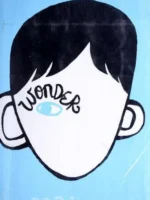The Book Thief, Markus Zusak, 2005
- Author: Markus Zusak
- Genre: Youth
- Publisher: Knopf Books for Young Readers
- Publication Year: 1998
- Pages: 552
- Format: Paperback
- Language: English
- ISBN: 978-0375842207
- Rating: 4,4 ★★★★★
The Book Thief Review
About
Published in 2005, Markus Zusak’s The Book Thief is set in Nazi Germany and narrated by Death itself—a voice that’s both omniscient and weary. The novel follows a young girl, Liesel Meminger, who finds solace in stolen books and the power of words while her world collapses around her. It’s a story about survival, language, and the fragile humanity that endures even in the darkest times. Zusak’s writing is lyrical and haunting, blurring the line between beauty and grief.
Overview
Liesel is sent to live with foster parents in a small German town during World War II. Her foster father teaches her to read, and her fascination with books becomes an act of quiet rebellion against fear and censorship. When her family hides a Jewish man, Max, in their basement, Liesel’s secret life intertwines with the war’s violence and the compassion that survives it. The story is as much about the people who risk everything for decency as it is about the cruelty of indifference.
Summary
(light spoilers) The novel opens with Death observing Liesel’s life from afar, collecting souls while watching her discover language as resistance. She steals her first book from a gravedigger’s apprentice, then another from a Nazi bonfire. Through words, she builds a bridge between herself and Max, the Jewish man she hides. As the war intensifies, tragedy closes in—bombings, betrayal, and loss. Yet the novel ends on an echo of hope: even after destruction, stories remain. Death’s closing remark, “I am haunted by humans,” captures the paradox that drives the novel—our capacity for both cruelty and grace.
Key Themes / Main Ideas
• The power of words — language as salvation and weapon.
• Innocence in wartime — childhood shaped by history’s brutality.
• Compassion and guilt — moral courage in impossible times.
• Death as narrator — mortality turned into witness.
• Resistance — small acts of defiance against tyranny.
Strengths and Weaknesses
• Strengths — Original narration, emotional resonance, and unforgettable imagery.
• Strengths — Balances brutality with beauty without sentimentality.
• Weaknesses — Some metaphors feel overextended, but their sincerity makes them work.
• Weaknesses — Pacing slows in the middle, though the tension never disappears.
Reviewed with focus on themes, audience, and takeaways — Markus Zusak
| pa_author | Markus Zusak |
|---|---|
| ISBN | 978-1-952-33676-4 |
| pa_year | 1961 |
| Pages | 332 |
| Language | English |







